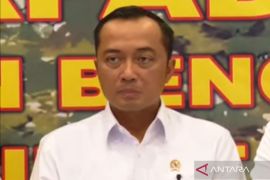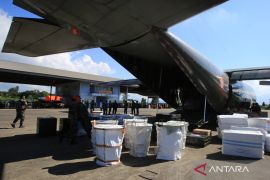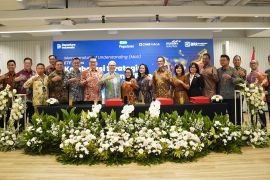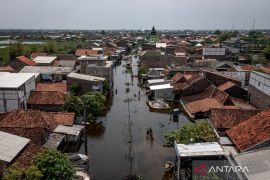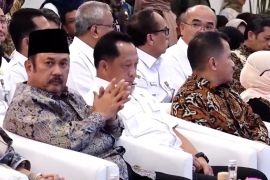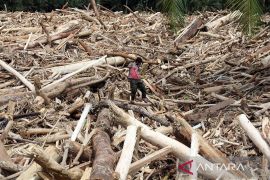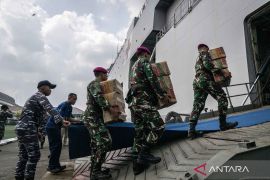"Illegal, Unreported, and Unregulated Fishing harms not only the economy but also the environment," Marine Affairs and Fisheries Minister Susi Pudjiastuti said.Jakarta (ANTARA News) - Commitment of Indonesian Government to completely eradicating Illegal, Unreported and Unregulated (IUU) fishing activities in its territorial waters is understandable because it has received praise from the Food and Agriculture Organization of the United Nations (FAO).
Indonesia is an important FAO partner country, particularly in the implementation of the organizations 2030 Sustainable Development Agenda, according to FAO Director General Jose Graziano Da Silva.
On the sidelines of the Letter of Appointment submission from Ambassador Esti Andayani as Permanent Representative of the Government of Indonesia for FAO Headquarters in Rome recently, Da Silva remarked that Indonesia has obviously contributed actively to the eradication of IUU Fishing practices.
According to him, Indonesia has become a state party to the Agreement on Port State Measures to Prevent, Deter, and Eliminate Illegal, Unreported and Unregulated Fishing.
IUU fishing is a serious matter and not only is the enemy of Indonesia but also the world, and therefore, all countries should agree that it should be eradicated completely.
Such a criminal act of IUU fishing respects neither national boundaries nor international attempts to manage fishing in the high seas, and is a serious global problem that contributes to over-fishing, creates unfair competition, and impedes sustainable fisheries.
Therefore, harsh measures have been adopted by the government of Indonesia, such as detonating and sinking foreign fishing vessels trespassing and poaching Indonesian waters.
The FAO director general opined that Marine Affairs and Fisheries Minister Susi Pudjiastuti is an influential and respected figure, even at the global level.
On various international occasions, Da Silva said Pudjiastuti also consistently calls for the eradication of various aspects of closely related crime such as smuggling and slavery.
FAO has stated that Indonesia is the second largest fish producer in the world, but the country is not the largest fish exporter, and does not even go in the rank of 10 major fish exporting countries.
Hence, the rise of IUU fishing is pointed out as the reason why Indonesia is not the largest fish exporting country in the world.
IUU fishing has lasted for more than 30 years but not many who understand such a criminal act.
However, the government of President Joko "Jokowi" Widodo is committed to taking the strongest possible action against foreign illegal fishing vessels, warning that Indonesia will not hesitate to even sink them if necessary.
Minister Susi Pudjiastuti has stated that the perpetrators of illegal fishing certainly did not like the extreme steps being taken by Indonesia, but according to her, the regulation to safeguard a countrys territorial sovereignty is the right of all nations.
In accordance with a presidential instruction, the marine and fisheries minister said she had to focus on the eradication of illegal fishing.
Further, she called on the international community to be aware of the devastating impacts of illegal fishing and must implement a more sustainable fishing method to save the ocean.
"Illegal, Unreported, and Unregulated Fishing harms not only the economy but also the environment," Pujiastuti remarked in Jakarta recently.
The minister stated that China has prepared to suspend fishing activities in its waters in the border area of Natuna Sea, Indonesia.
Chinas fishing moratorium is a good example to protect the countrys maritime and fishery resources for future generations, she remarked.
"The authority has cracked down on illegal fishing for the past three years. If the government chose to wait for another five years, then the fisheries resources might be severely depleted," Pudjiastuti pointed out.
The minister added that one of countrys important waters is a breeding zone, comprising of 60 percent of tuna, which is frequently threatened by over-fishing activities.
The United Nations and the European Union had been previously invited to oversee the countrys action to eradicate illegal fishing, Pudjiastuti stated, while adding that the invitation was a step to reaffirm the world organizations commitments towards a sustainable fishing sector.
Indonesian government has been assertive to punish the criminals, she reiterated.
Indonesian government has adopted a "blue economy" strategy, a term which refers to a sustainable economy activity in the maritime sector, Pudjiastuti stated in a World Ocean Conference (WOC) in February.
The strategy has been adopted to harmonize the interests of preserving the environment in line with the economical motives.
As a vast archipelago nation, Indonesia has been the worlds second longest coastline country with a 97 thousand kilometer strand.
However, rampant illegal fishing has forced Indonesia to be pushed back to the seventh place in world tuna production.
Therefore, a sustainable management in maritime sector is important to bolster the countrys fishery productivity, as well as protecting the maritime sustainability.
Pujiastuti has stated that if Indonesia eradicated IUU fishing, the country would be honored and recognized by the world, and in reality, several neighboring countries are now taking a cue from Indonesias regulation restricting the IUU fishing in the territory that has increased the fish catch.
"Several countries, such as Laos, Myanmar, and Cambodia, are also implementing a moratorium policy to restrict illegal fishing. They have also established a fishery task force," Pudjiastuti has stated.
Other countries, such as Thailand, China, and Vietnam, have also put in place a moratorium policy on restricting the issuance of licenses for fishing vessels.
The minister noted that Indonesia has become a leading nation that prohibits IUU fishing and inspires other countries to preserve their marine resources.(*)
Reporter: Otniel Tamindael
Editor: Heru Purwanto
Copyright © ANTARA 2017


